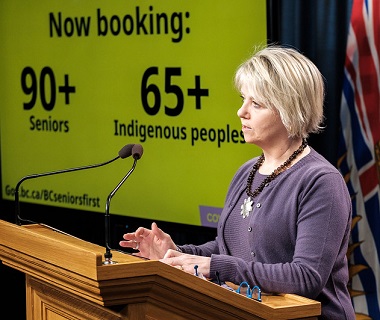
Dr. Bonnie Henry offered cautious words of optimism during her March 8 briefing. Province of British Columbia photo
Lent is a time of waiting. While the church prepares for Easter, we also await decisions from the provincial government about opportunities to meet in person again.
Dr. Bonnie Henry offered some hope, but was very cautious, when she spoke March 8:
We’re not going to rush to get things open, but we will take a thoughtful, careful and phased approach over the next few weeks.
I’d like to think of it as slowly turning up the dial again, rather than flicking the switch, because we know that we’re not yet in a place where we can go back to our pre-pandemic gatherings. . . .
As part of these efforts, we are working together with faith leaders to develop an approach to enable the gradual return of in-person religious services. Again, a phased approach, in the coming weeks.
We know there are many important dates coming up, in many faiths, and we are working on how to best safely enable these important and critical celebrations in our religious life to take place.
Dr. Henry didn’t give too much away in her response to Archbishop Michael Miller either. A March 5 article in The B.C. Catholic began:
B.C. health officer Dr. Bonnie Henry has turned down Archbishop J. Michael Miller’s request to let churches open to 10 per cent capacity.
In a seven-page document sent to the archbishop Thursday evening, provincial health officer Dr. Bonnie Henry said “it is not possible to grant your request . . . right now.”
Henry was responding to a 19-page submission Archbishop Miller sent to B.C. health officials February 19 asking that Catholic churches be permitted to celebrate Mass in-person with COVID-19 safety measures in place and an attendance limit of 10 per cent of capacity. . . .
Henry did offer Archbishop Miller a chance to work with Dr. Robert Daum of Simon Fraser University’s Morris J. Wosk Centre for Dialogue in a “process” to consider how to provide “small, safe indoor services for your parishes for the important Easter services.”
On another front, B.C. Supreme Court Chief Justice Christopher Hinkson reserved judgment March 5 after a five-day hearing in which three Fraser Valley churches sought to overturn provincial health orders intended to prevent them from holding in-person services.
***********************

Errol Rempel
While we wait for more developments, this March 5 presentation from Errol Rempel, District Superintendent of the local office of the Christian and Missionary Alliance, and his team, puts things in perspective. Two requests, near the end, are now awaiting government response.
Updated Position on Pandemic Restrictions and the Canadian Pacific District
Introduction
This document is supplemental to our previously-released Pandemic Restrictions and Civil Disobedience: The Canadian Pacific District Position. Please read or review that document prior to reading what follows. Potential for misunderstanding or misrepresenting our position is high without consulting that previous document.
Since that first document was posted, we as a district team have interacted with many dozens of Alliance pastors, members, and adherents who called, emailed and texted to offer opinions both pro and con on our document, to make additional arguments, to probe our rationale for our position, and in many cases, to express personal support and gratitude.
We are not merely being polite in expressing our thanks to all who communicated with us. Many of your comments and questions triggered healthy discussions and helped us refine our convictions and opinions. We are grateful to you and for you!
Our fundamental posture
Our core convictions on these matters as articulated in the document referenced above remain unchanged. We continue to affirm the gravity of the pandemic, the centrality of the epidemiological lens, the commitment to compliance with government restrictions for the Lord’s sake and out of love for others, the government’s efforts to communicate often and effectively with faith leaders, and our opposition to civil disobedience in the name of ‘our rights’.
Cumulative damage; troublesome inequities
However, as the pandemic lingers, we are increasingly sensitized to the cumulative mental, spiritual, emotional, medical and relational toll on many Alliance pastors, members and adherents due to our collective inability to meet in groups or for in-person worship.
Furthermore, we are aware of growing anger and frustration among us over inequities in the treatment of faith communities over against other entities and enterprises and what they are permitted to do. We have come to share the concerns of many over these inequities.
We have grown concerned about how ‘event-like’ (in epidemiological terms) shopping at ‘big-box’ stores has become where hundreds of people are shopping simultaneously and breathing the same air at chokepoints such as entrances, escalators, and checkout lines. These stores are nonetheless open while churches are closed for in-person worship because church services are classed as ‘events’ with higher risk of transmission.
We have grown concerned over the government’s lack of engagement with faith communities over against some commercial interests.
We note that when transmission was spreading in fitness centres in November, and particularly with group fitness activities, these gatherings were prohibited. There was swift government action taken to work with the industry to develop safety protocols and plans that both considered the epidemiological concerns and also allowed for the resumption of some individual and group fitness activities by December.
In contrast, while religious gatherings were noted to be a cause of transmission and subsequently prohibited in November, to date there has been no government action to develop appropriate health and safety protocols and plans that would allow for churches to hold any gathering of any size.
We have grown concerned over the allowance for support groups such as Alcoholics Anonymous (AA) to meet in person while religious support groups such as small groups, mental health support groups, or grief support groups, etc. are not currently allowed to gather.
We believe in the value of groups such as AA and understand their importance in the recovery of individuals, but we also believe that there are many in our churches, including some with mental health diagnoses, that are suffering from a lack of support for their mental and spiritual health during the pandemic.
We believe that this support is essential and that there is inequity when some support groups are allowed to meet, and many others are not.
We were recently very disappointed by the decision of the Public Health Officer (PHO) to grant variances allowing outdoor worship for up to 25 people to three churches that had flouted Public Health Orders and were/are conducting weekly in-person worship. In effect, the PHO rewarded civil disobedience but provided no consideration to churches that were/are respecting the prohibition of in-person worship and have been highly supportive of the PHO.
The prominence and consequences of these inequities have prompted us to write the PHO.
We do not wish to be misunderstood here. We have enormous respect for the PHO and believe she brings superb experience and training to her current task. We believe that task to be extremely complex and that it involves balancing a myriad of competing interests and priorities, an impossible balancing act. Our core posture towards her, along with respect, is comprised of empathy and support. We pray for her often.
However, we believe there must be some adjustments to, and greater flexibility in, the public health orders for faith communities in light of the above concerns.
Concerns and requests
Consequently, on March 5, 2021 the CPD wrote to Dr. Bonnie Henry and respectfully expressed the concerns listed above and requested:
• That faith organizations be allowed to create documented safety plans in accordance with appropriate public health guidance that will allow them to reopen for worship in groups of 50 people if they so choose.
• That faith organizations be allowed to have religious support groups focused on mental and spiritual health gather under the same restrictions as support groups such as Alcoholics Anonymous.
We will report on the response we receive from the office of the PHO.
Conclusion
As the province moves to vaccinate all who are willing over the coming months, many of us are finally seeing some light at the end of the tunnel. Our district team remains committed to doing all we can to support, strengthen, resource, and encourage our pastors, elders, and churches while the horizon brightens!
This statement is re-posted here by permission.

“it is not possible to grant your request . . . right now.”
No. it is not a matter of impossibility. It is a matter of choice. Consistently Dr. Henry has made choices that show an inability or outright refusal to respect the right of peaceful assembly. A refusal to respond to requests, even from human rights commissions no less, for explanations for policy, is a choice.
A refusal to negotiate conditions for a return to worship services, until recently, was a choice. She has freedom to make choices but also responsibility to make fair choices, choices that communicate good will and respect. The choices she has made have done otherwise.
I appreciate learning about how churches are thoughtfully engaging Dr. Henry. My local Wendy’s Restaurant has a sign on its door that states, “Dinning Room . . . occupancy limit 40 people.” The size of the dinning room is smaller than our worship area, and equivalent to our lobby. Even if we wore masks the entire time during the hour service (unlike at eateries), we still are not allowed to gather.
This is inequitable. Yet, it is not religious discrimination as some assume. Theatres and other venues face similar challenges. Perhaps if we rented restaurants or bars for our services, it would be okay.
But churches HAVE been permitted to host AA and narcotics anon meetings, so no, the church buildings are not the issue. The services are the issue.